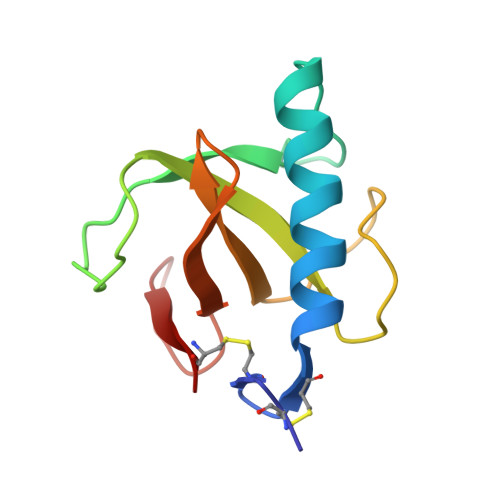RNase T1 mutant Glu46Gln binds the inhibitors 2'GMP and 2'AMP at the 3' subsite.
Granzin, J., Puras-Lutzke, R., Landt, O., Grunert, H.P., Heinemann, U., Saenger, W., Hahn, U.(1992) J Mol Biology 225: 533-542
- PubMed: 1350642
- DOI: https://doi.org/10.1016/0022-2836(92)90937-f
- Primary Citation of Related Structures:
1RGK, 1RGL - PubMed Abstract:
On the basis of molecular dynamics and free-energy perturbation approaches, the Glu46Gln (E46Q) mutation in the guanine-specific ribonuclease T1 (RNase T1) was predicted to render the enzyme specific for adenine. The E46Q mutant was genetically engineered and characterized biochemically and crystallographically by investigating the structures of its two complexes with 2'AMP and 2'GMP. The ribonuclease E46Q mutant is nearly inactive towards dinucleoside phosphate substrates but shows 17% residual activity towards RNA. It binds 2'AMP and 2'GMP equally well with dissociation constants of 49 microM and 37 microM, in contrast to the wild-type enzyme, which strongly discriminates between these two nucleotides, yielding dissociation constants of 36 microM and 0.6 microM. These data suggest that the E46Q mutant binds the nucleotides not to the specific recognition site but to the subsite at His92. This was confirmed by the crystal structures, which also showed that the Gln46 amide is hydrogen bonded to the Phe100 N and O atoms, and tightly anchored in this position. This interaction may either have locked the guanine recognition site so that 2'AMP and 2'GMP are unable to insert, or the contribution to guanine recognition of Glu46 is so important that the E46Q mutant is unable to function in recognition of either guanine and adenine.
- Institut für Kristallographie, Freie Universität Berlin, Federal Republic of Germany.
Organizational Affiliation:


















